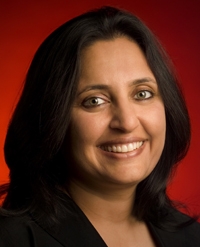Finally. Why doesn't Obama just drop this sleazy woman and move on? She claims that at the time she was the National Coordinator of the VHP America, the Gujrat massacres had not yet occured, and she was only raising funds for earthquake victims for them (as if she couldn't have worked for a less heinous organization, like the Red Cross). Well, did she bother to say a word condemning them and the VHP's undisputed role in them after the Gujrat killings, or distance herself from her association with the VHP? Never. What she did is continue to address youth conferences associated with the VHP (which Martha Nussbaum has described as, “possibly the most successful fascist movement in any contemporary democracy”) and the RSS. Imagine the uproar if someone said, “Oh, I was just helping with humanitarian relief efforts in Gaza as National Coordinator of Hamas's US wing. I am so against violence!” She keeps whining that questioning her ties to fascist parties is just “guilt by association” just the way Obama was smeared by allegations of ties to Bill Ayers. This is ludicrous. Barack Obama was not the National Coordinator of a fascist hate group implicated in large scale massacres (of thousands of people). The analogy could not be more false. It will be a terrible mistake if Obama appoints her to his administration. Her judgment as well as her character are extremely suspect.
This is Gautham Nagesh in the National Journal:
 The controversy has been gathering steam in the Indian press and South Asian blogosphere for weeks now, but it went mainstream on Thursday when former GOP Senator Rick Santorum published an op-ed in the Philadelphia Inquirer questioning the appointment of Shah to the transition team — prompting a Lost In Transition post Friday.
The controversy has been gathering steam in the Indian press and South Asian blogosphere for weeks now, but it went mainstream on Thursday when former GOP Senator Rick Santorum published an op-ed in the Philadelphia Inquirer questioning the appointment of Shah to the transition team — prompting a Lost In Transition post Friday.
Shah, a Google executive who previously worked for Goldman Sachs and served as a Treasury official in the Clinton years, was appointed to the Obama transition team in November and has since been tapped to be part of the three-person team to develop technology policy. She is also reportedly being considered for Secretary of Energy.
However, her appointment to the administration has drawn strong reactions from the South Asian community. While many prominent Indian-Americans have stood behind Shah, others have raised doubts about her past. Dr. Shaikh Ubaid is part of a group including several Muslim and Sikh associations and dozens of college professors that sent letters to both Shah and President-elect Obama, requesting further information on Shah's past associations.
“When she was appointed, it was initially a proud moment for us, her being an Indian-American,” said Ubaid in an interview given before Shah's latest statement. However, the reports regarding Shah's past ties to the VHP gave Ubaid and others a cause for concern.
More here. [Thanks to Manas Shaikh.]
